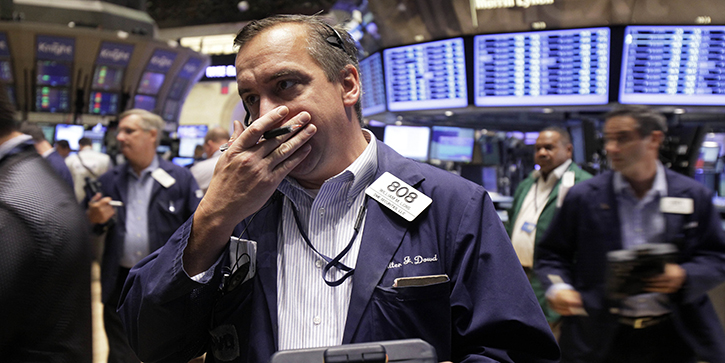
What Happens If We Get a Recession?
-
 Jared Dillian
Jared Dillian
- |
- August 10, 2017
- |
- Comments
You might have heard of skew, where out-of-the-money put options are more expensive than out-of-the-money call options.
That’s (partly) a function of spot-dependent volatility—if the market declines to the strike of the put, it is likely to be more volatile than if it goes up to the strike of the call.
So, if you think we’re going to have a bear market, and that stocks are going to decline 30%, you then have to think about the spot-dependent Fed, spot-dependent politics, and spot-dependent economics.
What I’m saying is: nothing happens in a vacuum. If stocks decline 30%, we will be living in a vastly different world than we are today.
I am bearish. I have been bearish since 2435 in the S&P 500, when I called the top. I think the market will decline.
How much it will decline is anyone’s guess, but let’s just pick a number—30%—and do some thinking about what the world looks like if that happens.
Spot-Dependent Politics
President Trump spends a lot of time talking on Twitter about the stock market. He should probably stop doing that.
The stock market is up about 20% since he was elected, but he doesn’t make it go up. It went up on the prospect of economic reforms which now seem a lot less likely, and yet it is still limping upward.
Trump can’t control the stock market (outside of the Fed buying stocks, which is probably not going to happen), so the yapping on Twitter will be powerless to stop the bear market once it begins.
He has also given liberals about 80,000 rounds of ammo to shoot at him once the market goes down. I’m sure screenshots of those tweets have been taken.
But there’s a bigger issue here. Rightly or wrongly, a bear market and/or a recession will get pinned on Trump.
Going further, it will be blamed on capitalism, and the backlash against conservative economic policies will be so severe that 2020 or 2024 could mark the beginning of full-blown socialism in America.
If you think political debate in this country is poisoned and acrimonious now, wait until the next recession. It will become an all-out war.
Spot-Dependent Fed
If stocks go down 30%, what will the Fed do?
Well, the Fed’s plans to run off the balance sheet will go out the window.
Like what you're reading?
Get this free newsletter in your inbox every Thursday! Read our privacy policy here.
It’s entirely likely that the next Fed will be even more aggressive fighting a recession than Ben Bernanke was. That could mean the return of quantitative easing. It could even mean OMT (Outright Monetary Transactions), when the Fed prints money and doesn’t buy bonds—just literally hands it out.
It’s tough to trade that, because we don’t know what is going to happen. It’s not even clear that you would buy bonds in that scenario—in the event of OMT, the yield curve could steepen significantly.
Talking about QE and OMT is premature—there isn’t even a whiff of a downturn yet. What I am saying is that with the SPX 750 points lower, and GDP running negative, the Fed will turn into firefighters.
Whether it’s the Cohn Fed or the Warsh Fed or the Yellen Fed, they will use every tool imaginable, and some that are currently unimaginable.
Spot-Dependent Economics
It would be hard for the S&P 500 to drop 750 points without getting a recession.
A recession means job losses—which also feeds into spot-dependent politics. You think a Trump administration wants to preside over a 10% unemployment rate? Every policy tool available will be thrown at the labor markets, up to and including possibly the creation of New Deal-style make-work agencies.
In this newsletter, I’ve talked about some pretty drastic stuff, like OMT, and now make-work projects. But you have to look at this from a social psychology standpoint—we, as a country, have no appetite for failure, and we also have no appetite for letting laissez-faire economics run its course.
During the next recession, there will be interventions on a massive scale.
Spot-Dependent Volatility and Credit
With the S&P 500 at 1750, the VIX will be a lot higher than 9 (and a lot higher than the 12 it went up to Tuesday after Trump’s “fire and fury” comments). I can guarantee that.
Also, credit spreads will be much wider, as the default rate will explode. Financial conditions will be much less accommodating.
There could even be a minor bear market in housing, a few bank failures, and some tapping of the FDIC, although not to the scale of the financial crisis.
Statistically speaking, active funds will do better against passive funds (they usually have higher levels of cash), and hedge fund strategies will do the best of all. Holders of the Vanguard 500 Index Fund will be down 30%, and pretty unhappy.
Notice we haven’t even talked about the potential for a vol “superspike” or some market dislocation, which has the potential to crush investor confidence. It’s hard to have a bear market without it getting disorderly at some point.
The good news: valuations will return to normal. The bad news: it won’t be much fun getting there.
Just Spitballing
It’s fine to predict bear markets, but you have to use your imagination about what it will feel like, viscerally, when one happens. The S&P 500 hasn’t posted a 1% daily move since May—we haven’t even had a stressful day in the stock market in months.
Like what you're reading?
Get this free newsletter in your inbox every Thursday! Read our privacy policy here.
So if you are going to go around predicting bear markets, you had better be emotionally prepared for one when it happens. I’ve traded through the last two. Both times I thought I was going to lose my job. One time I actually did.
Probably, this time will not be any different.
subscribers@mauldineconomics.com
Tags
Suggested Reading...
|
|

 Jared Dillian
Jared Dillian

